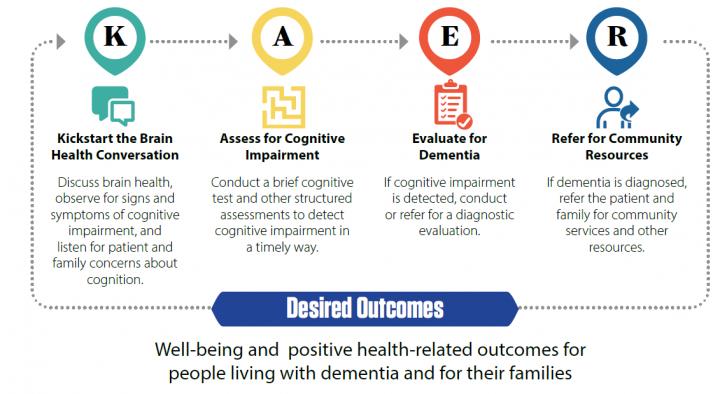
Credit: The Gerontological Society of America
The Gerontological Society of America (GSA) has released a new edition of its KAER toolkit, which is intended to support primary care teams in implementing a comprehensive approach to initiating conversations about brain health, detecting and diagnosing dementia, and providing individuals with community-based supports. It includes practical approaches, educational resources, and validated clinical tools that teams can integrate into their clinical workflow.
The GSA KAER Toolkit for Primary Care Teams is focused on a model first introduced in a 2015 report from the GSA Workgroup on Cognitive Impairment Detection and Earlier Diagnosis. The acronym is derived from a four-step process:
- Kickstart the brain health conversation
- Assess for cognitive impairment
- Evaluate for dementia
- Refer for community resources
“Alzheimer’s disease and related dementias have been a longstanding priority area for GSA members,” said GSA Director of Strategic Alliances, Judit Illes, BCL/LLB, MS, CPHQ, who led the development of the new edition. “With the pending approval of a disease-modifying therapy, there is a renewed sense of urgency around improving early detection and diagnosis. However, it typically takes many years to translate new clinical tools and guidance into practice. We hope that the KAER toolkit will help to accelerate change.”
Among the enhancements from the toolkit’s original 2017 edition are a shorter, more accessible digital format; an improved format with navigation tabs for each step; key section takeaways for ease of use; a new section on ways care team members can be reimbursed for implementing steps in the toolkit; an expanded section on brain health and risk factors for dementia; and updated table of cognitive assessment tools; and an expanded section on referral to community resources and randomized controlled trials.
The content of the toolkit and selection of tools was developed for primary care teams. GSA recognizes that health care professionals outside the primary care setting also play a valuable role in detecting cognitive impairment. Medical educators and medical students may also find its contents useful.
“To assist healthcare professionals to provide the highest quality patient-centered care, it is recommended that professionals evaluate people age 65 and older for thinking and memory problems,” said Patricia Heyn, PhD, FGSA, an associate professor at the University of Colorado Anschutz Medical Campus who served as a reviewer of the toolkit.
“The KAER toolkit is guided by the current evidence and it supports that documenting mild cognitive impairment in a person’s medical record can be instrumental in alerting healthcare professionals and medical staff about the patient’s cognitive status, so that the best care is provided to the patient,” Heyn added. “Early diagnosis can help identify forms of cognitive impairment that may even be reversible, including those caused by sleep problems, depression, alcohol consumption, or medications. It can also help with new treatments and behavioral approaches that can improve a person’s daily living and quality of life such as correcting hearing loss and avoiding social isolation.”
GSA’s work on the KAER model and toolkit has attracted the attention of the U.S. Centers for Disease Control and Prevention (CDC), which has awarded a two-year Special Interest Project to review, refine, test, and evaluate components of the KAER toolkit in primary care. The award recipient is Annette Fitzpatrick, PhD, a research professor of family medicine at University of Washington (UW) and an affiliate investigator of the UW Health Promotion Research Center (a CDC Prevention Research Center). Fitzpatrick and her team will use the results from this project to provide suggestions for the practical application of the KAER toolkit and initiate steps for integrating tools into a broader reach of primary care practices within the multi-state UW Medicine network.
For the next phase of GSA’s efforts, a Sponsors Circle has been established to ensure that the KAER workstreams are sustainable so that program goals can be successfully achieved over a multi-year period.
“GSA looks forward to working with the initial supporters for 2021 — Eli Lilly, which also helped support the 2017 edition of the toolkit, and Avanir Pharmaceuticals — to raise awareness about best practices in dementia care and disseminate new KAER-related tools,” Illes said.
###
The Gerontological Society of America (GSA) is the nation’s oldest and largest interdisciplinary organization devoted to research, education, and practice in the field of aging. The principal mission of the Society — and its 5,500+ members — is to advance the study of aging and disseminate information among scientists, decision makers, and the general public. GSA’s structure also includes a policy institute, the National Academy on an Aging Society.
Media Contact
Todd Kluss
[email protected]
Original Source
https:/




